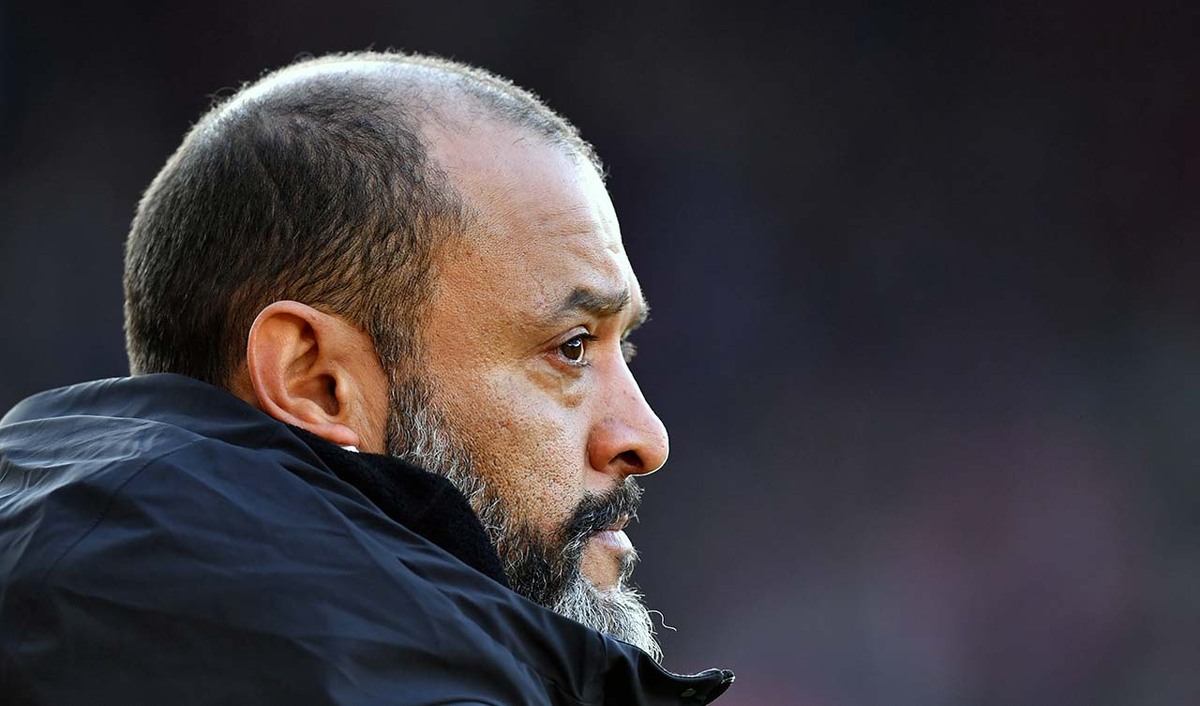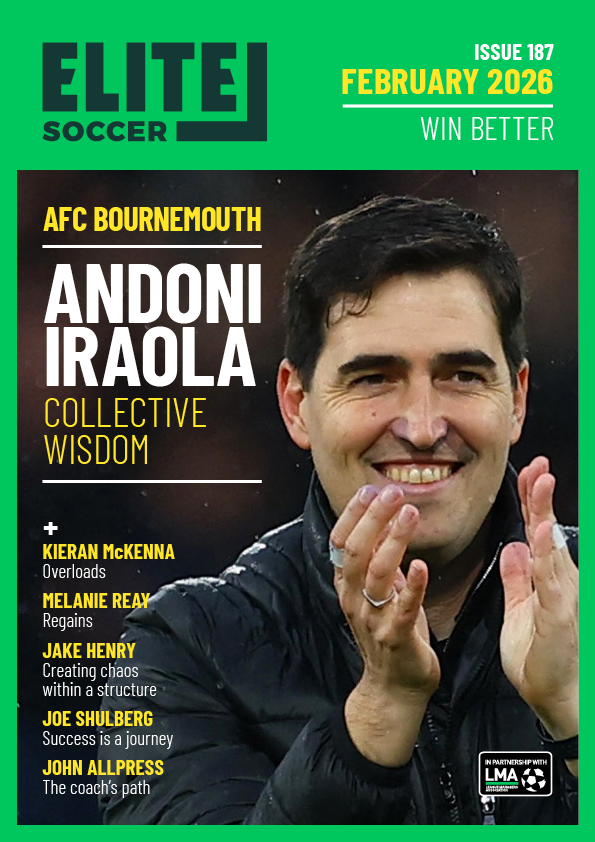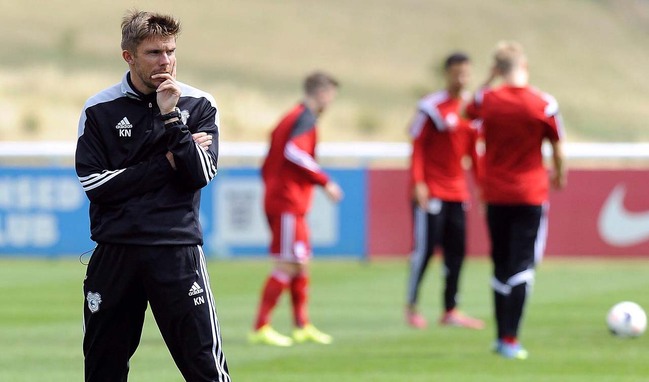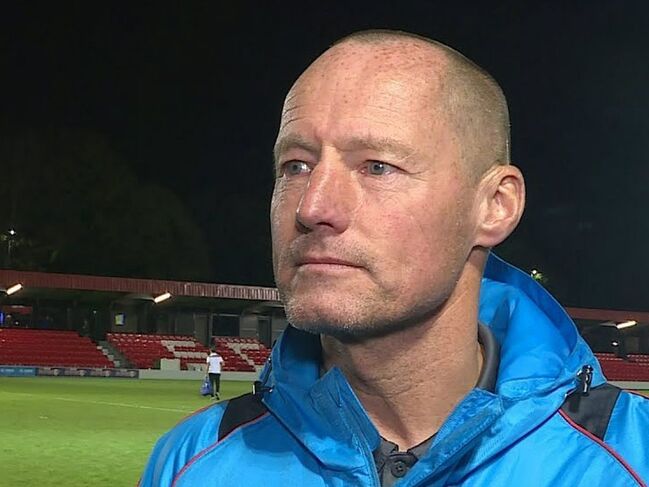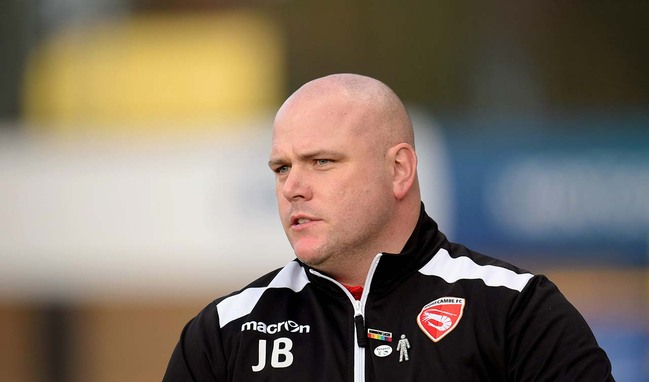NEXT ELITE SOCCER COACHING AWARD COHORT STARTS FEBRUARY 16 - ENROL NOW
You are viewing 1 of your 1 free articles
Stay Humble
It has been an incredible year for Nuno Espírito Santo. The former Valencia and Porto manager enjoyed a fantastic first season at Wolverhampton Wanderers, when the club won the EFL Championship and achieved promotion to the Premier League. And for the job he did in transforming Wolves into winners, he was voted LMA Championship Manager of the Year.
Here he talks about what made him the coach he is today…
What in your upbringing helped to shape the coach you became?
I was born in a beautiful place, the island of São Tomé. Up until the age of seven I lived by the sea and it gave me a real feeling of freedom, which I’ve never really lost. I think that’s why, as a manager, I like to be out on the pitch, where you can walk around, and feel open and free to express yourself.
That trait is also down to the fact that my parents gave me the freedom to be myself. They were regular people – my father worked in a bank and in security, before running a grocery business with my mother. They were simple, good people with great values.
I also spent a lot of time with my grandparents and, when I look back, I can see they were a big influence on me. I like dialogue, to speak and to listen, and I don’t like to force my decisions or methods onto others.
I want to communicate with them, educate them, bring them around to my way of thinking, and work with them.
What made you want to become a manager?
It was in my last season as a player, at 37, that I started considering management. I was interested in the reasoning behind decisions and liked the strategy element of the game, and I realised I was already watching matches like a manager.
José Mourinho, my manager when I was goalkeeper at Porto, was also a major influence on me. In fact, it’s clear he had a big impact on the team as a whole, as many of the players in that side went on to become coaches and managers.
How did you make the transition to coaching?
I started out as assistant coach to Jesualdo Ferreira at Málaga. I think taking that position was the best decision I could have made. It was incredible to work with someone who I could learn so much from.
He was very patient with me, speaking with me openly for hours about the game and answering my many questions. I then worked with him for a further season at Panathinaikos in Greece, before taking a year away from club football to complete my coach education. I did my UEFA Pro Licence in Scotland, which is where I met Ian Cathro, now my first-team coach at Wolves.
What part has the fact you were a goalkeeper played in your management style?
As a goalkeeper you’re able to watch the game unfold. It gives you a different perspective and enables you to observe and understand the space and movement better than when you’re on the sidelines.
Even now, as a manager, I always walk around the pitch during
training, so I can watch the game from all angles, including from behind the goal to give me the same view I had when I was a goalkeeper. I also have a camera behind the goal, so I can watch things back from that viewpoint. That, after all, is what the players see when they’re on the pitch; the timing and decision making feel different when you experience it from the side.
I know I can help them better if I’m able to see things as they do. The same is true during a match. I try to absorb myself totally in what’s happening on the pitch and be part of the game with my team, to experience what they’re experiencing throughout the game. By doing this, I hope to be able to make better decisions. So I live action by action, moment by moment – are we on the back foot or on the front foot? I’m totally focused.
What are your underlying principles as a manager?
My leadership is based on shared decision making. The people in my backroom team are so important, because they’re the foundation of everything. What starts off as my idea will, over the course of a few days, evolve with the help of my staff. Everyone embraces the idea, contributes their own views and it becomes ‘our idea’.
When you do have an idea as a leader, you have to first convince other people to follow it and then see if it works. After that, it’s the team’s reaction and feedback that will guide which way you go next. That means not only verbal feedback, but also the way in which the team trains and performs thereafter.
Any decision you make should also depend on the attributes of your players, because you can’t force an idea through if you don’t have the right people to carry it out. So I make decisions with the players, with my coaching staff and the club, but at the end of the day, as the leader, the final say is still mine.
I’m honest and will speak my mind, but I’m respectful. I’ll always listen to what someone has to say, but I also trust my own instinct on what’s the right thing to do.
What’s the key to becoming a good manager?
Recruiting to your team is like solving a puzzle. You have to identify what each player would bring to the team and how that might help you to execute your plans and ideas. A player might not necessarily be the most skilled there is, but he might be the piece you need to complete your puzzle.
To become a good manager, you have to be a good coach. If you don’t coach your players, you can’t make the right choices for them, because you won’t experience first-hand what they’re able to give you. I always say that management decisions are based on coaching, on the technical, tactical and physical aspects of the game.
So, knowing what makes your players tick is vital?
Knowing your players and recognising their individual needs is essential, and that takes time. You have to listen to them, be with them and observe their behaviour. I encourage them to be true to themselves and to show me what’s inside them. It needs to be deeper than just a relationship between a coach and a player. For example, I will ask them how they are, if something is wrong, and whether that’s because of something that’s happened inside or outside of the club.
The mental health and wellbeing of the players is so important, as it is for the manager. Managers often say we never stop working, but what they really mean is our brains never switch off. I find golf is one of the best tools for taking a break from thinking about management, because you have to concentrate so hard on what you’re doing on the course.
How have you found the experience of managing in England?
I managed in Portugal and Spain before coming to England. You have to adapt when you come to work in a new country, and I think I’m able to do that with ease. I try to always be myself and stay true to my philosophy and values, so it’s very important that the club and I are a good fit. That means I always make a point of speaking with people at the club before making a decision about a new role; it’s important for me to know if the club’s ideas and vision are compatible with my own.
I’ve learned during my career that when you go to a new club the most difficult thing to change is the culture. You can’t go to a club, especially one in a different country, and try to change the culture completely. You can share your ideas, but not impose things.
What you can do, however, is establish the foundation on which you want your team to work. For example, I believe you have to be humble enough to recognise that you can improve, and humble enough to listen and learn.
It may not change the culture, but it does educate. I believe it’s an approach the whole club needs to take, and certainly that’s the case at Wolves, where everyone is focused on growing and evolving together. We are all looking at how we can shape the club and feed into our common aims.
We even have ‘Stay humble’ written on the gym wall of our training ground. I commissioned the painting of wolves, because it reflects the spirit of the team. They are humble, they are brave and they protect the interests of the team. We are strong as a group and always put the needs of the team before the needs of individuals. I guess this area of the training ground is like our wolf’s cave, where we hold many of our team talks, make our decisions and share our thoughts. Having that message up there in such a striking way really helps it stick in the mind.
Editor's Picks
Attacking transitions
Deep runs in the final third
Using the goalkeeper in build-up play
Intensive boxes drill with goals
Penetrating the final third
Creating and finishing
My philosophy
Pressing initiation
Compact team movement
Coaches' Testimonials

Alan Pardew

Arsène Wenger

Brendan Rodgers

Carlos Carvalhal

José Mourinho

Jürgen Klopp

Pep Guardiola

Roy Hodgson

Sir Alex Ferguson

Steven Gerrard
Coaches' Testimonials

Gerald Kearney, Downtown Las Vegas Soccer Club

Paul Butler, Florida, USA

Rick Shields, Springboro, USA

Tony Green, Pierrefonds Titans, Quebec, Canada
Join the world's leading coaches and managers and discover for yourself one of the best kept secrets in coaching. No other training tool on the planet is written or read by the calibre of names you’ll find in Elite Soccer.
In a recent survey 92% of subscribers said Elite Soccer makes them more confident, 89% said it makes them a more effective coach and 91% said it makes them more inspired.
Get Monthly Inspiration
All the latest techniques and approaches
Since 2010 Elite Soccer has given subscribers exclusive insight into the training ground practices of the world’s best coaches. Published in partnership with the League Managers Association we have unparalleled access to the leading lights in the English leagues, as well as a host of international managers.
Elite Soccer exclusively features sessions written by the coaches themselves. There are no observed sessions and no sessions “in the style of”, just first-hand advice delivered direct to you from the coach.
